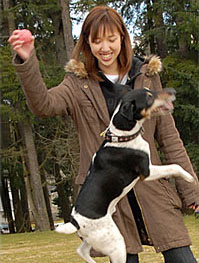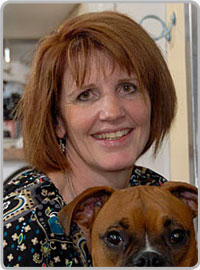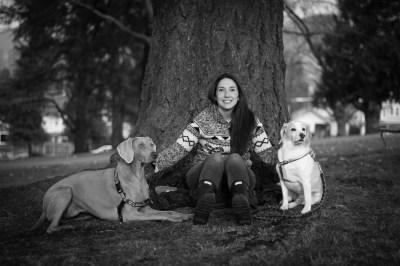Attend a VOAC info session
Join one of our information sessions for the Fall 2025 intake to learn more about the program, meet our instructors, and receive your application package. Upcoming information session is on October 23 at 6:30pm via Zoom.
This Veterinary Assistant program has been meticulously crafted for Douglas College by a practicing veterinarian, in close collaboration with experts from the animal care community. Upon successfully completing the program, you will be awarded a Veterinary Assistant Certificate that is widely acknowledged and recognized throughout British Columbia.
- Program Tuition and Duration
- Program purpose
- Admission Requirements
- Program outcomes
- Program and Course Structure
- Instructors
- Course Calendar Descriptions
- Testimonials
Program Tuition and Duration
The tuition for this program is $6,569 and includes a stethoscope, scrubs and thermometer, and the Fear Free certification exam. Books are extra and cost approximately $210 (including tax) in total.
BC Student Loans Eligibility
Contact voac@douglascollege.ca for information about student loans.
Program Duration
The duration of the VOAC program is 24 weeks:
- Semester I - 10 weeks
- Semester break - 1 week
- Semester II - 10 weeks
- Practicum, Follow-up and Graduation - 4 weeks
Refund policy
A full refund, less a $15 processing fee per course, will be issued if a written request for a refund is received by Sultan Vidal three working days prior to the start of the program. 70 percent less $100 refund after the start of the program and prior to the end of the first week. No refund after the first week of classes. Fees for materials, supplies, books, etc. are not eligible for refunds.
Program purpose
The purpose of the Veterinary Office & Animal Care (VOAC) certificate program is to develop the career ready skills, knowledge and attitudes necessary to perform the multifaceted duties of veterinary assistants. The program focuses on small animal (domestic) assistant training and the essential practical skills training will take place off campus at animal shelters, veterinary clinics and rescue agencies.
The Veterinary Office & Animal Care certificate program is designed to assure that:
- Douglas College is the first choice for students seeking a career as veterinary assistants
- Graduates will feel confident that they possess the all the necessary skills and attitudes to be successful in their new career
- Graduates will be the first choice by the animal care community for employment
The VOAC Certificate program has incorporated the Douglas College signature by:
- Basing the curriculum on the development of skills, knowledge and abilities essential to students' work such as: independent learning and information literacy, communication (oral, written and interpersonal), critical and creative thinking, teamwork and computational and technical skills
- Providing "hands-on" training and "real world" assignments, case studies and practicums that are guided by the ethics of practice
- Supplying balanced and varied learning modes and methods
- Creating a learning environment that enhances student success
- Committing to seek verification of applied skills standards through external agencies and advisory boards
Admission Requirements
Must complete all of the following:
- Submit a resume
- Submit official transcript of BC secondary school graduation or equivalent
- Completion of English 11 with a grade of C or better
- Completion of Life Sciences 11 (formerly Biology 11) with a grade of C or better
- 18 years of age or older by the end of the first semester of the VOAC Program. A copy of birth certificate or other proof of age is required.
- Keyboarding speed of at least 20 words per minute
- Possess basic computer skills.
Other Criteria
When offered a seat in the program the following criteria must be satisfied:
- Proof of current Tetanus immunization.
- Purchase extra scrub (you will be provided with a scrub with the Douglas College logo).
Please note: The admission package contains all forms. To receive a package, please email voac@douglascollege.ca.
Program outcomes
At the end of the program, the successful student should be able to:
- Perform and understand the duties of a veterinary team member in a small animal clinic/hospital or related field (animal shelter, rescue organization).
In the front office setting:
- Book appointments, perform receptionist and bookkeeping duties, operate veterinary software, as well as offer nutritional, patient care and grief counselling.
In the examination room, treatment area, surgery or kennel
- Make a basic assessment of a patient's status, whether for a wellness exam, or in an emergency situation.
- Identify common small animal breeds, and be able to handle and restrain animals safely.
- Promote good health and hygiene by demonstrating adequate grooming skills and knowledge of external parasite control.
- Understand basic veterinary terminology, with applications to anatomy, physiology, and numerous small animal disease processes.
In the laboratory (under veterinarian supervision)
- Operate a binocular microscope, prepare for and perform common basic laboratory tests, and use and maintain most laboratory and clinical diagnostic equipment.
- Assist the veterinary technician during the following: taking standard X-rays, administering anaesthesia to a patient, and during dental and surgical procedures.
In the operating area (under veterinarian supervision)
- Handle and maintain surgical instruments, as well as wrap and sterilize surgical packs.
- Demonstrate familiarity with common surgical procedures including small animal spays and neuters, and offer important homecare instructions.
The successful Veterinary Office & Animal Care program graduate will become a valuable member of the veterinary care team.
Program and Course Structure
This course is offered in person. Class sizes will be limited to ensure an effective learning environment. While our intention is to remain in-person, there may be circumstances where delivery will shift to virtual sessions. If that occurs, sessions will continue at the originally scheduled times. To participate online, students will require high-speed internet, a webcam, and a microphone.
Please note: the program will be offered at the New Westminster Campus. Six months (24 weeks), 640 hours. Classes are Monday - Friday from 8:30 am - 2:00 pm.
New Westminster Campus - Spring 2026 intake:
Application deadline: February 6, 2026
(Applications will be accepted after deadline if seats are available)
March 9 to May 15, 2026
- Grooming Handling and Restraint
- Veterinary Anatomy, Physiology & Terminology I
- Veterinary Care I
- Veterinary Nutrition
- Veterinary Administrative Procedures I
Reading Break: May 16 to May 24, 2026
May 25 to July 31, 2026
- Veterinary Laboratory Procedures
- Veterinary Diseases
- Veterinary Anatomy, Physiology & Terminology II
- Veterinary Care II
- Veterinary Administrative Procedures II
August 4 to August 25, 2026
- Practicum (3 weeks) & Follow-up
Instructors
All instructors are current in their field and will continue to practice on non-teaching days.
| Dr. Ashley Milner | Doctor of Veterinary Medicine | 2 courses |
| Dr. Katherine Klassen | Doctor of Veterinary Medicine | 1 course |
| Janice Werger | Registered Veterinary Technician | 2 courses |
| Carrie Hudson | Registered Veterinary Technician | 4 courses |
| Nicole Scott | Registered Veterinary Technician | 1 course |
Course Calendar Descriptions
| Grooming, Handling and Restraint | This course is designed to enable the student to identify various breeds of small animals and understand the necessary components of handling and restraint. Personal safety is emphasized. The recognition and prevention of aggression in small animals is included. Basic grooming procedures such as shaving, bathing, dematting, and brushing, as well as trimming nails, cleaning ears, and expressing anal glands will be demonstrated. External parasite control and the products utilized will be introduced. |
|---|---|
| Veterinary Anatomy, Physiology & Terminology I | This course is designed to teach the veterinary medical language by the study of prefixes, suffixes, root words, and pronunciation of words. Common veterinary medical abbreviations will also be covered. Anatomy and physiology are included in order to increase the understanding of the veterinary medical vocabulary. The knowledge and usage of correct terminology will better enable the veterinary care assistant to communicate with veterinarians, animal health technicians, and most professionals in the medical field. |
| Veterinary Care I | This course is an introduction to and overview of veterinary care for cats and dogs. Students will learn how to obtain a patient's medical history and determine and record vital signs as part of the physical examination. Normal behaviour, handling, and restraint of cats and dogs, pain assessment, caring for a hospitalized animal, homecare, the human-animal bond, and euthanasia are covered. Common veterinary pharmaceuticals and dosages and methods of administering medications, intravenous catheter care, fluid therapy, and other veterinary therapeutics are introduced. Recognition and triage of situations requiring emergency treatment is emphasized. |
| Veterinary Nutrition | This course is designed to enable the student to understand the principles of nutrition, with regards to feeding for all life stages of the small animal. The importance of good nutrition, major nutrient components, interpretation of the ingredient list, and classification of feeding methods will be emphasized. Various types of formulations will be discussed. The use of prescription or specialty diets will be introduced with regards to feeding the healthy, orphaned, diseased, or geriatric patient. |
| Veterinary Administrative Procedures I | This course is an introduction to Microsoft Word, and a brief introduction to Microsoft Windows and PowerPoint. With Microsoft Word students will create documents used in a veterinary setting. Students will also use Microsoft Word to prepare job search documents in preparation for their practicum and will begin the process of compiling a career portfolio. Employability Skills will be stressed throughout the course. This is a hands-on and self-paced course in which students will integrate computer skills with document formatting. AviMark Veterinary Software will be introduced. |
| Veterinary Laboratory Procedures | This course is designed to enable the student to perform basic clinical or lab procedures including the use and management of veterinary lab equipment. Students will be introduced to the handling and care of diagnostic equipment, as well as the materials and methods required to perform common diagnostic tests. Understanding and usage of the major disinfectants will be covered. The proper documentation of laboratory requisition forms and results, as well as blood and other specimen handling will be demonstrated. |
| Veterinary Anatomy, Physiology & Terminology II | (Prerequisite: Veterinary, Anatomy, Physiology & Terminology I) This course is designed to further the necessary language skills of the veterinary care assistant. It includes the endocrine, gastrointestinal, neurological, muscular, urinary, sensory, and reproductive systems. Hands-on experience will be covered on field trips. |
| Veterinary Diseases | This course will introduce the student to several causes of disease, and the differentiation between bacteria, viruses, protozoa and fungi. Various modes of disease transmission, preventative medicine, identifying types of vaccines, and small animal vaccine schedules are included. A brief overview of the causes, clinical signs, treatment, and prevention of common diseases of several body systems will be covered. |
| Veterinary Care II | (Prerequisite: Veterinary Care I) This course will introduce the student to several critical areas of veterinary practice. The veterinary radiology component will include the methods and positioning necessary to take a proper X-ray, as well as the chemicals required to develop one. Veterinary anesthesia, including sedation, induction, maintenance and monitoring will be discussed. The veterinary dentistry component consists of learning the normal dentition of the juvenile & adult small animal , basic dental homecare and prophylactic dental care in hospital. |
| Veterinary Administrative Procedures II | (Prerequisite: Veterinary Administrative Procedures I) This course is designed to introduce the student to the administrative duties and procedures required in a veterinary clinic/hospital setting. Topics covered will include reception skills, appointment scheduling, telephone techniques, filing, record management, and Employability Skills. These procedures will be taught and learned using hard copy documents and, where applicable, popular veterinary software programs (Cornerstone). |
| Practicum | The practicum is an important component of the program. It is where you will further hone your acquired skills in an animal care practice for three weeks. This valuable experience will greatly improve your employability and will, if your performance warrants it, supply you with a reference for launching your new career. Some of our graduates have been hired from their practicum placements. The practicum is mandatory for graduation. To be eligible you must successfully complete all the coursework and demonstrate employability skills throughout the program. |
Testimonials

| A willingness to do it all - from scrubbing floors to communicating with patients' owners - is essential in her job, says Jade Yuan. |

| Coming to college gave Sharon Jamieson a chance to meet new people and get the hands-on skills she needed to get a job she loves. |

